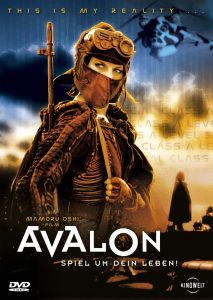 [vc_widget_sidebar sidebar_id=”sidebar-sidebar-reviews”]
[vc_widget_sidebar sidebar_id=”sidebar-sidebar-reviews”]
Avalon
Japan, Poland (2001), 107 minutes
Starring: Malgorzata Foremniak, Bartek Swiderski, Dariusz Biskupski
Reviewer: Vance Aandahl
Genre: Action, Fantasy, Science Fiction
Rating: 5
Mamoru Oshii must be a magician, for only a magician could use Japanese digital wizardry in a bleak, rubble-strewn Polish cityscape with an all-Polish cast to present two of the stalest, most overworked concepts in virtual reality science fiction (the VR world thats capable of rendering the less fortunate adventurers brain-dead in reality, and the old VR shell game thats meant to leave the audience wondering afterwards which world actually is the real one), and only a magician would also have the audacity to use one of the stalest, most overworked cinematic styles, the style of a vintage 1960s avant-garde French art film (brooding black and white cinematography with lots of weird camera angles and striking contrasts between light and shadow, an emphasis on mood and atmosphere instead of plot and action, a deliberately slow place in scenes that seem to have no significance, lots of existentialist nuances and indecipherable symbolism, and a tone so intellectual and serious that even Buster Keaton couldnt make it smile), and certainly, only a master magician, only an alchemical genius of the highest order, could then breathe life into this horrid hodgepodge of disparate, apparently incompatible elements, transforming them into a wonderfully strange and compelling movie that amazingly enough almost works (but not quite, alas) as a unified esthetic experience, with an incredible soundtrack and some camera shots that deserve to be immortalized: in particular, the closeups of the people cooking and eating, the prolonged still-life studies of the heroine basset hound lying motionless on the floor, and just about every face you see when she decides to visit the nursing home for brain-dead gamers.

